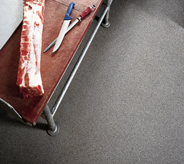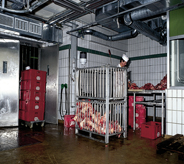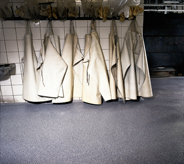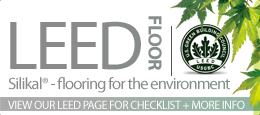Meat Processing Companies Count on our Unequalled Flooring
Silikal® Nationwide Flooring- 888.830.1404
-

Silikal is in high demand for meat processing flooring, as it is lifetime flooring even though it will be put through cleansing procedures that would decimate other flooring.
Enlarge -

Floors in a meat processing plant take a huge amount of abuse, from the cold, from dropped tools, to having fork lifts zipping back and forth, thus they need to be extra durable.
Enlarge -

Meat processing floors will need to be extremely anti slippery, considering that they are cleaned at night with high powered hoses and steam.
Enlarge
The Problem
Turn on the television nowadays and it is likely you will come across a story about a food recall due to contamination. The sad fact is, as well controlled and regulated as the meat industry is by USDA, FSMA, HACCP audits and the like, 3,000 PEOPLE DIE in the US EVERY YEAR FROM FOOD POISONING.
The CDC states that in addition, 128,000 are hospitalized and 48 million get sick every year from foodborne pathogens. Some of this is in part due to Listeria and other bacteria that thrive in the holes, cracks, and worn spots in your plant flooring.
So why do meat processors allow their flooring to get that way? The meat industry is extremely tough on floors. On a daily basis, floors are subjected to thermal shock [hot washdowns on cold floors] physical abuse from pallet jacks, tubs, buggies, and forklifts, and chemical attack from meat acids and sanitation chemicals. This abuse wears out most concrete floors in a few years.
Resinous Flooring
Most food processors have tried epoxy and cementitious urethane overlayments with limited success. Epoxy formulations are too rigid, will not handle the thermal shock from hot washdowns, and delaminate. Cementitious urethanes are so porous that everything that spills on the floor ends up being absorbed into the overlayment, ultimately causing holes, cracks, and delamination. In a survey taken in 2013, the average resinous floor installed in the food processing industry lasted LESS THAN 5 YEARS!
Additionally, both of these formulas require 24 hours [after installation is completed] to reach substantial curing and do not completely cure for 7 DAYS! Who can afford to shut down for that long? Most companies start back up long before curing has taken place, compromising the overlayment’s ability to perform per specification.
The Silikal® Difference
Silikal’s proprietary slip-resistant formula [similar in chemistry to Plexiglas] has no pores or pinholes. Therefore, nothing will penetrate the surface. This is why Silikal outlasts and outperforms every other floor in a food processing environment. We have customers with 25 year-old floors that look and perform like new!
Silikal flooring cures in one hour – at temperatures down to 0°F! This means that a Silikal installation can be fit into your schedule – often without loss of production – saving your company thousands!
Silikal floors are installed by business partners that have been field-trained by company employees. You can be sure that with Silikal, your floors will be properly installed to provide your company many years of trouble-free service – and we have a guarantee to back it up!





 COLOR MIXING DESIGN TOOL
COLOR MIXING DESIGN TOOL
 COLOR CHARTS + BLENDS
COLOR CHARTS + BLENDS
 SAMPLE REQUEST
SAMPLE REQUEST

 Silikal®is manufactured + sold in conformity to
Silikal®is manufactured + sold in conformity to
 Avoid Costly Downtime
Avoid Costly Downtime